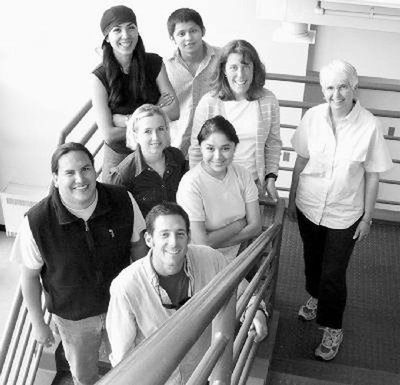June 6, 2002
Partnership with area tribes is thriving
Steve Hill
University Week
The UW’s Sciences and Tribes Educational Partnership (STEP) is entering its third summer on some kind of a roll.
The program began in 2000 as a collaboration between the University and the Quinault Indian Nation. A modest number of students, mostly from the Taholah School District, participated during that first year. Today the program managed by the UW’s Nan Little has grown to include six tribes, 10 teaching assistants, an assistant program manager and almost 60 students for this summer’s June 16–July 12 institute.
“We’re really excited about the growth of the program,” Little said.
Once again Little and the students will be visiting research centers at Big Beef Creek and Pack Forest, then returning to the UW campus to compile and analyze data. But the most important goal is to prepare American Indian students to succeed at the University.
In the case of Jo Payne, the institute worked just as Little and others had hoped. Payne was a junior at Forks High School when he participated in the first summer institute. Today, as a STEP teaching assistant, the Quileute tribal member (he was an exception among the Quinault Indians in the first group) is one more example of the program’s success.
“That was a really big experience for me,” Payne said, recalling his first trip to the UW campus two summers ago. “To be away from home for a month and to be a part of so many new things was really a good experience.”
In fact, the experience was so good that Payne returned to campus in the fall of 2001 as a Gates Millennium Scholar. He’s completing his freshman year and looking forward to another summer institute. And the tribal community is clearly enjoying Payne’s success.
“Whenever I speak with someone from the tribe they tell me how proud they are of Jo,” Little said.
Payne, too, acknowledges that his role in the community has become more important than it was a few years ago. He said he’s not aware of any previous tribal members that have gone on to college.
“I was always known as the kid who went to class and did well in school,” he said. “Going to college was taking it to a new level. I think for the younger kids on the reservation, they can look at me and see that it’s possible. It’s achievable.”
Little hopes that Payne is just one of the first among several success stories for STEP. This summer’s institute has added tribal students from the Colville, Lummi, Muckleshoot, Quileute and Yakama Nation’s as well as another group from the Quinault Nation.
In addition to the teaching assistants and Little, five tribal elders will be part of this summer’s institute serving as cultural advisers to the students. Little said the tribal elders bring depth and wisdom to the program, making it a truly holistic experience for the students.
For Payne, his new role with STEP is one more important experience as he works toward the goal of a degree. He’s currently undecided on a major but is interested in both fisheries and teaching. Whatever degree track he eventually pursues, Payne is sure of one thing.
“At some point after I graduate I’ll want to go back to the reservation and get a job there — probably not right away, but at some point.”
Payne isn’t the only teaching assistant from a Washington-area tribe. Three members of the Yakama Nation will serve as teaching assistants, as well as one each from the Coeur d’Alene, Nez Perce and Turtle Mountain Chippewa Tribes. The assistant program manager is Upper Skagit.



